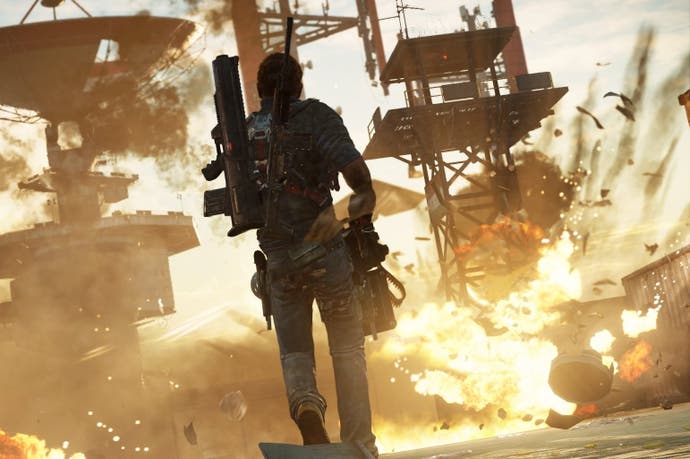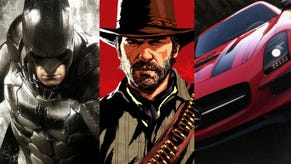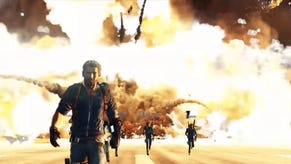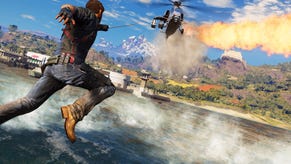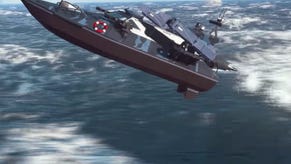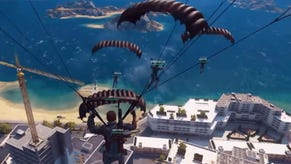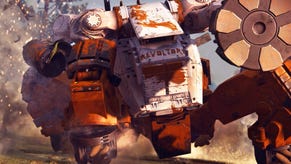Just Cause 3 review
Splosion, man.
Just Cause 3 starts as it means to go on. Following a winking credits sequence soundtracked by a crooning cover version of The Prodigy's Firestarter, you're dropped into the game standing atop a speeding plane, using a rocket launcher to take out ground targets as flak explodes all around you.
Following this explosive introduction, you don't have to wait long until you're given a tank turret to play with. Then a minigun. Then you're introduced to your new tether weapon, which lets you attach two objects together and yank them towards each other. Then a wingsuit that lets you swoop at high speed across the countryside of Medici.
Just Cause 3 is a game that literally cannot wait to show off its toys. And, unlike too many other games which draw you in with cool stuff only to take it away and make you earn it all back, Rico Rodriguez gets to keep pretty much everything he is given in this relentless opening salvo.
The "dictator removal specialist" is now more superhero than guerrilla fighter, even if his newly bearded face makes him look like Nick Knowles from daytime TV classic DIY SOS. He can absorb ridiculous amounts of damage, all the better to line up those wacky tether gags; he can fall from an exploding helicopter without breaking every bone in his body, and with his wingsuit he can now "fly". It's not flight in the sense of Superman, of course, but his controlled glide is generous in range and easily triggered with a single button press. Once mastered, you can grapple and glide across vast distances. This is a game where getting from place to place in a car - or, heaven forbid, on foot - is doing it wrong.
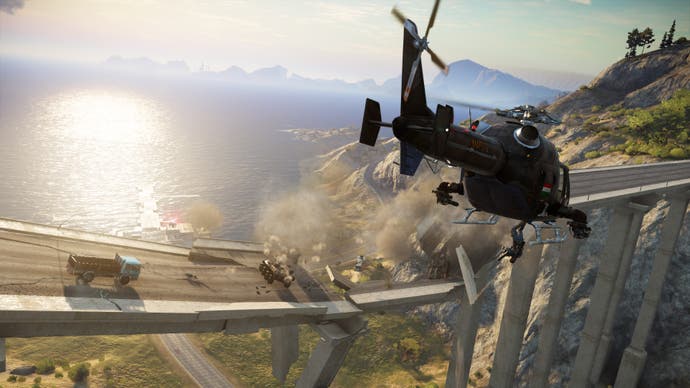
Rico has returned to Medici, his birthplace, to help his childhood friend Mario rid the land of General Sebastian Di Ravello. He's a dictator in the classic style, right down to his crisp white military uniform, bushy facial hair and habit of executing underlings who disappoint him. He's also using Bavarium, a volatile element found only on Medici's sprawling islands, to build world-changing weapons. That's a bad thing.
As in previous Just Cause games, Di Ravello's grip on Medici must be weakened by freeing the land piece by piece. Towns can be liberated by destroying propaganda billboards and loudspeakers, and by taking control of the corrupt local police stations. Military installations, on the other hand, range from small guard outposts to vast, sprawling bases. Detonating fuel tanks, crippling electrical generators and even demolishing gigantic radar spires and dishes are all required. All of these "Chaos Items" are marked with a red stripe, and you quickly become adept at spotting them.
Once you've met all the requirements for liberating a location, it becomes free and offers various benefits. You may unlock a new vehicle or weapon, as well as standalone challenges. These mini-games aren't as optional as you might think, since they're the only way to earn Gears, the currency needed to level up your abilities and gadgets. Demolition challenges provide Gears towards your grenades. Checkpoint races add bonuses to vehicles, such as turbo boosts.
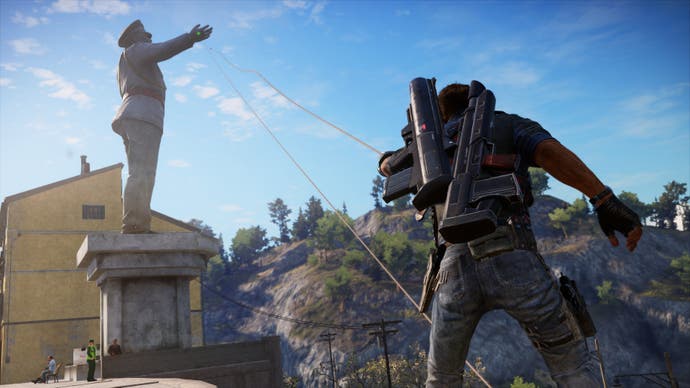
All of these perks are applied to the gear you call down from your rebel allies in air drops, but these require beacons that can only be restocked at liberated locations. Fast travel between freed provinces is free, but to take a similar short cut in the wild means using a flare - another finite resource that must be collected from friendly bases and extended with Gear improvements.
It's a small but complex web of interconnected needs, all of which ties back to the ongoing thrust of Just Cause 3: create mayhem, and lots of it. There are story missions, but these are generic in the extreme and periodically send you back into the world to liberate more people before the tale can continue.
For the most part, you're going to be blowing stuff up, so it's just as well that this is the one thing that the game does exceptionally well. Fuel tanks sputter and shake before detonating in big Hollywood fireballs: gigantic blossoms of orange and red flame flecked with dirty black smoke. Each one feels exquisitely timed, and chain reactions are common. Put one bullet into a pump at any of Medici's gas stations and then sit back to watch the escalating devastation.
It's bewitching and exhilarating, yet never tainted by the sort of chest-thumping machismo that can give games like Call of Duty such a queasy undertone. You'll no doubt see Just Cause compared to Michael Bay because of this lascivious fascination with combustion, but it's really a Roger Moore-era Bond movie as directed by Robert Rodriguez. Outrageous, but self-aware enough to make the carnage fun.
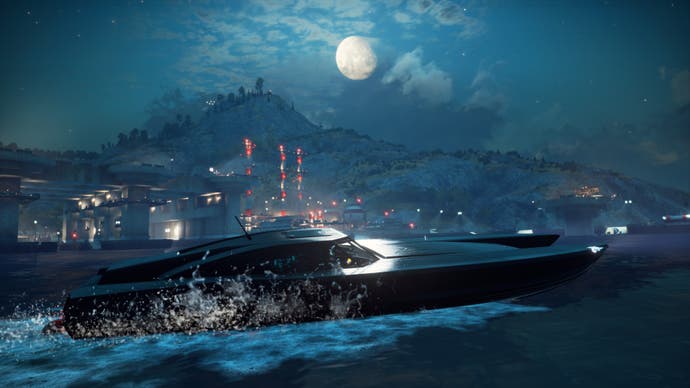
That fun gets stretched very thin over the sheer size of Just Cause 3's map, however. One of the disadvantages of that bombastic opening, and the willingness to give the player cool toys up front, is that there's nowhere for the action go. Liberating your 50th location from enemy control feels much the same as liberating your first, and while there are some cool unlocks to be earned - such as the infamous rocket bombs - their end results are the same explosions you've already created thousands of times already. Instead, the game escalates simply by spamming you with more and more enemies, often literally appearing out of thin air.
Initially awesome, but with sadly little in the way of depth or pace, Just Cause 3 is a game best enjoyed in small doses. Parcel up its decadent mayhem into chunks of an hour or less and it retains its allure for longer. Experienced in prolonged form it's easy to become, if not bored, then at least numb to the game's boisterous charm.
The problem becomes more pronounced in the latter stages as you venture north into the map's mountainous regions. For one thing, the game has dropped both the mini-map and compass from its HUD, so simply finding your bearings or locating the last few "Chaos Items" needed to free a location means dipping in and out of the map screen every few minutes. In addition, the distance between settlements and mission markers can stretch to 9km or more, and it becomes clear just how little there actually is to do in all this virtual real estate.
There are the obligatory hundreds of collectibles sprinkled around the place, but there's not much in the way of life or personality. Each town is much the same as the others, while NPCs are drab automatons that would look more at home in Goat Simulator. Unlike other sandbox titles, Medici isn't really a world that rewards too much speculative exploration. This isn't a GTA or a Fallout, where every detour tells a story. It's a world you're meant to fly over in a wingsuit rather than engage with up close.
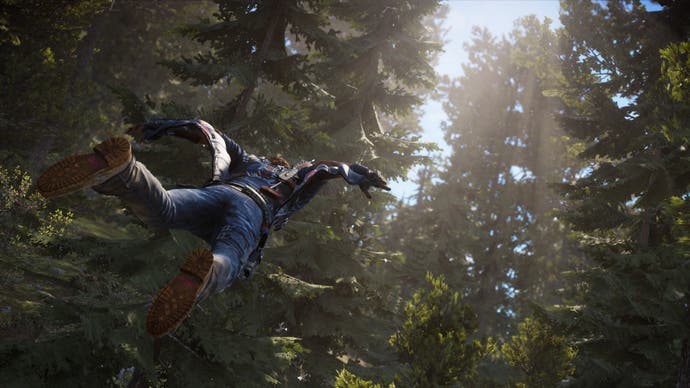
The story could bring some much needed personality to this pretty but featureless backdrop, but it never quite takes flight. There are some fun characters, but the missions themselves struggle to offer a compelling change of pace from the open-world mayhem. Man this turret. Use this sniper rifle to protect those tiny NPCs. It's a parade of laughably predictable scenarios. There are lots of escort missions. There are also frustrating timed missions. There are, unfortunately, many timed escort missions. It all ends with an absolutely atrocious boss battle that utterly ignores all the freedom that makes Just Cause distinctive, and instead traps you in a tiny empty area and relies on blundering gameplay clichés that fell out of favour in the 1990s.
More problematic still are the game's technical issues. Loading screens are frequent, ponderous and distracting, with waits of a minute or more to restart challenges or reload checkpoints. Minor physics glitches abound, though that's hardly unique in a game this size. That doesn't make it any less annoying when, for example, the helicopter you call in from an airdrop lands and is on fire for no reason. Or when the car you're using in a race suddenly vanishes, leaving Rico standing in the middle of the road.
It's the frame rate that truly strikes at the heart of Just Cause 3 though. This is a game built around massive, explosive anarchy, yet (on console) the game engine slows to a crawl whenever that actually happens. Not just occasionally, but constantly. Even during quieter moments, it's an unpredictable thing. The fact that the game's raison d'etre makes it feel like you're playing in treacle is a real enthusiasm killer, especially when that sluggishness results in your death and another elongated loading delay.
It's easy to be bowled over by Just Cause 3 at first. It's big and brash and gives really great explosion. There's just not much more to it, and over 30 hours, what was once exhilarating becomes rather wearying. Add in some technical issues that are especially damaging to a game as action-driven as this, and you've got a sugar rush of a game whose appeal wears off long before the end credits roll.
